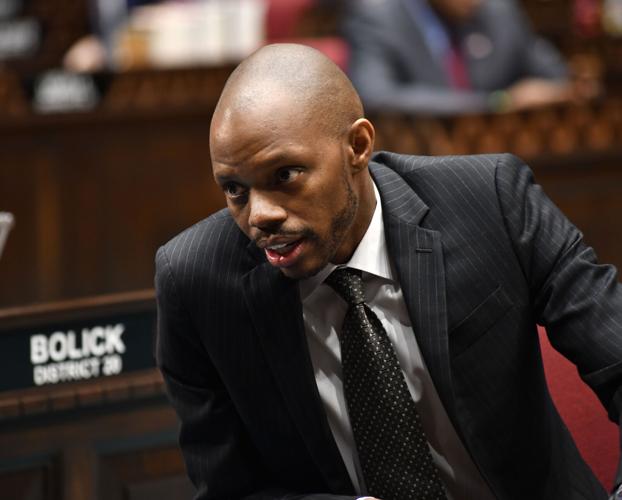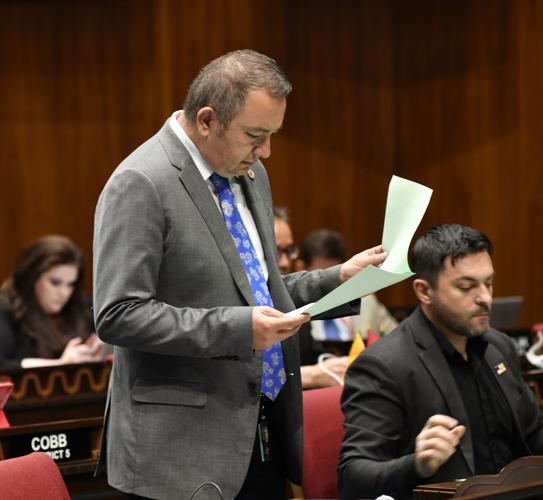PHOENIX — Despite an anticipated $5 billion state surplus, Republican legislative leaders are considering doing nothing more with the next budget than keeping spending at current levels.
That could let them get of town sooner.
So far they have been unable so far to craft a deal on the state budget for the upcoming fiscal year, as individual lawmakers jockey for how each wants to allocate surplus money.
About $1.3 billion is expected to be an ongoing surplus, which some want to use for things like new programs or tax cuts. Perhaps another $4 billion of the surplus is in one-time funds that can be used for specific one-time projects, such as building bridges and roads or paying off debt.
The stalemate comes as lawmakers return to the Capitol on Monday for what, according to the official calendar, is supposed to be the last week of their 2022 session.
The GOP leaders are looking for an exit strategy, possibly by simply doing the minimum required of legislators and finally shutting down the session that began in January.
The fact is, the Arizona Constitution gives lawmakers just one mandatory job: Adopt a budget.
So a plan being shopped around to rank-and-file members involves enacting what might be called a “skinny budget.” It would essentially take the current expenditure levels, adjusting for inflation and growth, and adopt those as the spending plan for the fiscal year that begins July 1.
House Majority Leader Ben Toma, R-Peoria, said he thinks Democrats would go along with what would more formally be called a “continuation budget.’’
But House Minority Leader Reginald Bolding, D-Laveen, said Republicans are fooling themselves if they think Democrats are willing to leave that much money on the table unspent this coming fiscal year to provide votes for a continuation budget.
“How do I tell a parent whose child is in a classroom with a substitute teacher to just wait one more year for your kid to get a full time teacher, or another who’s sleeping on the street in the Arizona heat another summer, to just say, ‘Stay on the street one more year because were’ not putting money in homeless shelters,’ ‘’ Bolding asked.
His Senate counterpart, Rebecca Rios, D-Phoenix, said Senate President Karen Fann, R-Prescott, is offering nothing to Democrats to support a continuation budget.
“She recognizes if she gives us anything in this skinny budget, then it’s no longer a skinny budget and everybody’s going to want their items in there,’’ Rios said.
Fann said she is willing to talk deals. At some point there must be some common ground where everyone — or at least a majority of the lawmakers — get at least some of what they want, she said.
In fact, Fann said she shares some of the priorities Democrats have, such as dealing with the homeless situation.
“If people are homeless because they have mental illnesses we need to get them better help so that we can get them back to some sort of a safe, fulfilling life,’’ Fann said. Ditto, she said, about getting treatment for those living on the street who are addicted to drugs.
“I know a lot of people say that’s not our problem,’’ she said. “Well, it is our problem. And it’s a problem getting bigger.’’
Fann said there are other possible compromises.
Democrats want a state version of the earned income tax credit, where those in low-paying jobs get some state cash. In exchange, Fann said, they might be willing to provide some votes for a proposal by Sen. Paul Boyer, R-Glendale, to expand the voucher program for private and parochial schools to include all families in poverty.
None of this talk of compromise with Democrats should be necessary. After all, Republicans control both the House and Senate as well as the governor’s office.
But those margins are razor thin. And that has allowed Boyer — and possibly others — to hold out for things they want.
For Boyer, it’s not just voucher expansion.
He said voters made it clear in 2020 they want more funding for K-12 education, by approving Proposition 208.
The only reason it didn’t take effect was that the Arizona Supreme Court said the cash raised by the 3.5% income tax surcharge on the wealthy could not be legally spent absent legislative action. But Boyer said the state, now flush with cash, could easily fund that $900 million from existing proceeds.
Democrats support that. Even GOP leader Toma said it may be doable.
But to complicate matters, he, in turn, wants something: universal vouchers, regardless of income or need, far more than Boyer is proposing.
“We either believe in parental choice, or we don’t,’’ Toma said. “You either believe that you know what’s best for your child or you don’t believe that you as a parent know what’s best for your child and the government knows better.’’
That, however, remains a non-starter for Democrats.
Trying to wrap up the legislative session is even more complex than that. For example, Republicans want to repeal, re-enact and accelerate the $1.9 billion tax cut package they approved last year.
That measure collapsed all the income tax brackets into a single 2.5% rate. The big winners are those who have taxable income of more than $159,000 a year — double that for married couples filing jointly — who had faced a 4.5% tax rate.
Only thing is, foes of the plan gathered more than enough signatures to put the measure on hold until voters could have the last word this coming November. But if the plan is repealed and replaced with something else, the petitions turned in seeking a public vote become meaningless.
Toma said petition circulators lied to signers. “The way it was done in front of Trader Joe’s by my house was ‘If you don’t sign this, they’re going to cut $2 billion from education,’ which is a complete lie first of all,’’ he said.
But Toma, who hopes to be House speaker next year, figures he and Republicans have time on their side if some decisions are deferred until after the 2022 election.
At that point, he thinks Republicans will have more than their current one-vote edge in the House and the Senate, and more wiggle room.
Toma said he thinks that’s safe to assume. It’s a midterm election, with an unpopular Democratic president in the White House. And the new Arizona legislative lines drawn by the Independent Redistricting Commission also appear to give Republicans an edge.
Bolding, however, said Republicans are deluding themselves if they believe the 2022 election will be a GOP cakewalk. He said that ignores the reality of how well Democrats have done recently at the statewide level, as Joe Biden won the state’s presidential election and Democrats won both U.S. Senate seats, as well as the statewide offices of secretary of state and schools superintendent.
“I don’t subscribe to the notion that Democrats won’t have more people coming back to the Legislature,’’ Bolding said.
He added, “Who’s to say who will be leading the governor’s office?’’ Gov. Doug Ducey can’t run for the office again due to term limits, and there’s a crowded field trying to replace him.
Meanwhile, Ducey would have to agree to a continuation budget — or any budget deal at all.
“We don’t negotiate through the press,’’ said his spokesman C.J. Karamargin.
But a skinny budget could prove unacceptable to Ducey. It would mean not just leaving that $5 billion surplus on the table for his successor, but also giving up on enacting all the programs and tax cuts he wants to put an exclamation point on his final year in office.
There’s another factor a play that may help force a solution sooner rather than later, with or without Democrats.
It’s an election year, and early ballots go out 29 days before the Aug. 2 primary.
The more time lawmakers spend at the Capitol, the less time they have to campaign, whether for reelection or some higher office. There’s also the fact that state law precludes legislators from taking campaign donations from lobbyists while they are in session.







